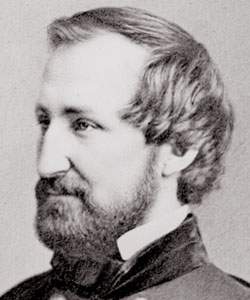William Starke Rosecrans (Congressional Biographical Directory)
Reference
ROSECRANS, William Starke, a Representative from California; born in Kingston, Ross County, Ohio, September 6, 1819; completed preparatory studies; was appointed to the United States Military Academy at West Point in 1838 and graduated in 1842; brevetted second lieutenant, United States Corps of Engineers, July 1, 1842; second lieutenant April 3, 1843; assistant professor of engineering at the United States Military Academy 1843-1847; in charge of various Government surveys and improvements 1843-1853; resigned from the Army April 1, 1854; engaged as an architect and civil engineer, with residence in Cincinnati; president of the Coal River Navigation Co., Kanawha County, Va. (now West Virginia), in 1856; organized the Preston Coal Oil Co. in 1857 and engaged in the manufacture of kerosene; during the Civil War reentered the service on June 7, 1861, as colonel of the Twenty-third Regiment, Ohio Volunteer Infantry; commissioned brigadier general, United States Army, May 16, 1861; major general, United States Volunteers, March 21, 1862; resigned from the United States Army March 28, 1867; moved to California and settled in Los Angeles; United States Minister to Mexico in 1868 and 1869; again engaged in civil engineering; president of the Safety Powder Co., Los Angeles, Calif., in 1875; elected as a Democrat to the Forty-seventh and Forty-eighth Congresses (March 4, 1881-March 3, 1885); chairman, Committee on Military Affairs (Forty-eighth Congress); was not a candidate for renomination in 1884; regent of the State university in 1884 and 1885; Register of the Treasury 1885-1893; reappointed brigadier general on the retired list, United States Army (act of Congress, February 27, 1889), and retired March 1, 1889; died near Redondo, Los Angeles County, Calif., March 11, 1898; interment in Rosedale Cemetery; reinterment in the Arlington National Cemetery, May 17, 1902.
"Rosecrans, William Starke," Biographical Directory of the United States Congress, 1774 to Present, http://bioguide.congress.gov/scripts/biodisplay.pl?index=R000440.
William Starke Rosecrans (American National Biography)
Scholarship
Despite the animosities he had engendered, Rosecrans parlayed his success at Corinth into command of the 99,000-man Army of the Ohio. He joined his force at Louisville on 30 October, renamed it the Army of the Cumberland, and strove to rejuvenate it after months of debilitating service in Tennessee and Kentucky. Within a few months, Rosecrans had resupplied every arm of his command, had upgraded the officer corps, and had improved unit training. Such actions raised the army's morale as well as its readiness and won "Old Rosy" the esteem and affection of the rank and file.
Rosecrans tested his revival program in late December, when he belatedly heeded War Department orders to challenge General Braxton Bragg's army in Middle Tennessee. On the last day of the year Rosecrans moved to strike Bragg's right flank across Stones River, near Murfreesboro, only to find his own right under attack. Refusing to panic, Rosecrans recalled his assault column and shored up his embattled flank. Despite teetering on the brink of defeat throughout the day, the Army of the Cumberland held on; two days later it survived a heavy assault against its left, forcing Bragg to abandon his strategic position. The victory made Rosecrans the most celebrated commander in the Union. He received the thanks of Congress, a brevet major generalship in the regular army, and highly placed offers of support should he seek political office. Abraham Lincoln personally thanked him for salvaging a victory, when "had there been a defeat instead, the Nation could scarcely have lived over."
Rosecrans tested his revival program in late December, when he belatedly heeded War Department orders to challenge General Braxton Bragg's army in Middle Tennessee. On the last day of the year Rosecrans moved to strike Bragg's right flank across Stones River, near Murfreesboro, only to find his own right under attack. Refusing to panic, Rosecrans recalled his assault column and shored up his embattled flank. Despite teetering on the brink of defeat throughout the day, the Army of the Cumberland held on; two days later it survived a heavy assault against its left, forcing Bragg to abandon his strategic position. The victory made Rosecrans the most celebrated commander in the Union. He received the thanks of Congress, a brevet major generalship in the regular army, and highly placed offers of support should he seek political office. Abraham Lincoln personally thanked him for salvaging a victory, when "had there been a defeat instead, the Nation could scarcely have lived over."
Edward G. Longacre, "Rosecrans, William Starke," American National Biography Online, February 2000, http://www.anb.org/articles/05/05-00676.html.



